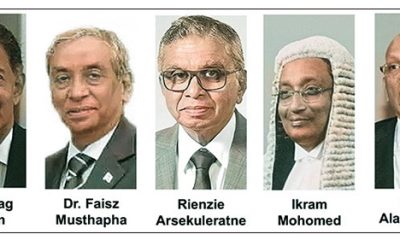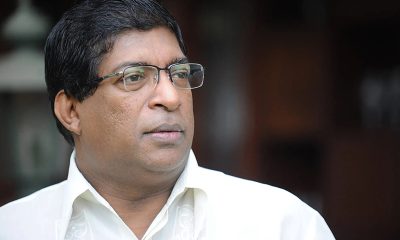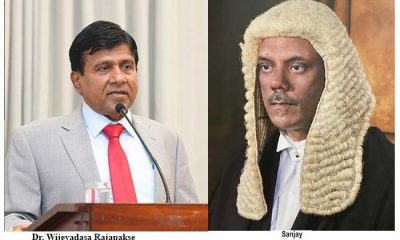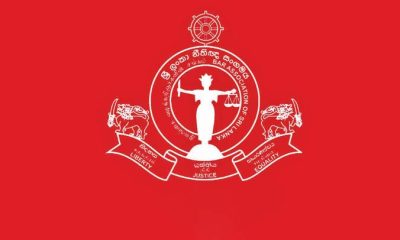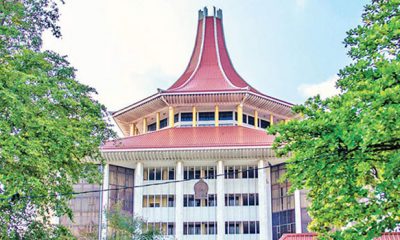Features
Supreme Court on 22A: Serious errors

Part I: Removal of the PM
By Dr Jayampathy Wickramaratne,
President’s Counsel
The Twenty-Second Amendment to the Constitution Bill (22A) was showcased by the Wickremesinghe-Rajapaksa Government as a restoration of the Nineteenth Amendment to the Constitution (19A) of 2015. Most 19A provisions were removed by the Twentieth Amendment to the Constitution. Many, including the writer, have pointed out that not all the provisions of 19A are sought to be introduced by 22A. The 22A Bill was challenged in the Supreme Court, mostly by Sinhala nationalist groups, who consider the Presidential form of government to be one assurance of majoritarian dominance.
The abolition of the ‘Executive Presidency’ was one of the significant demands of the Aragalaya, while going back to 19A was called for as an immediate measure. Over the last year or so, support for the abolition of the Executive Presidency has seen a marked increase. A survey conducted by the Centre for Policy Alternatives (CPA) in April 2022 revealed that 74% of the respondents wished for the complete abolition of the Executive Presidency, compared to 50.3% in October-November 2021. It is of interest that the figure among the Sinhalese, who wish for abolition (74.2%) was higher than the national percentage, clearly indicating that Sinhala nationalism is on the retreat.
The Supreme Court (Jayasuriya CJ, Aluwihare J and Obeysekere J) has determined that several key provisions of 22A require the approval of the people, at a referendum, in addition to a two-thirds majority, in Parliament. They are as follows: the President should not have the power to dismiss the Prime Minister; Ministers shall be appointed by the President on the advice of the Prime Minister; and that if the President does not make appointments to the independent Commissions, as recommended by the Constitutional Council, within 14 days, the appointments would be deemed to have been made. These three provisions were part of the Constitution, under 19A. The Supreme Court, in 2015, did not consider that they would require approval, by the people, at a referendum. There is thus a clear shift in the thinking of the current Supreme Court. The government has said that a referendum will be avoided by amending the Bill at the committee stage in Parliament. Thus, the President would only be required to consult the Prime Minister in appointing Ministers. The President can dismiss a Prime Minister even when the latter has a clear majority in Parliament. Premier Dinesh Gunawardena, beware!
Appointment and removal of PM
To the writer, the decision of the Supreme Court in the matter of appointing Ministers did not come as a surprise, given the reasoning of the Court (Jayasuriya CJ, Janak De Silva J and Obeysekere J) in its determination of the Samagi Jana Balavegaya’s Twenty-first Amendment to the Constitution Bill (21A), holding that the abolition of the Executive Presidency required people’s approval, at a referendum. The writer disagrees with that determination, which will be the subject of a forthcoming paper. But the determination in the 22A case that the President’s power to dismiss a Prime Minister, who commands the confidence of Parliament, is an essential part of executive power, did come as a surprise.
The Nineteenth Amendment took away the power of the President under previous Article 47(a) to remove the Prime Minister. The removal of the Prime Minister thus became a power of Parliament. New Article 48(2) provided that if Parliament rejects the statement of government policy, or the Appropriation Bill, or passes a vote of no-confidence in the government, the Cabinet of Ministers shall stand dissolved. The President could then appoint a new Prime Minister.
The 20A Bill sought to empower the President to remove the Prime Minister. The proposed provision was challenged. A five-member Bench of the Supreme Court, however, held that in view of the fact that the President, who holds the People’s executive power in trust for the People, is the Head of the Cabinet of Ministers and the appointing authority of the Prime Minister, empowering the President to remove the Prime Minister and appoint a new Prime Minister who, in his opinion, commands the confidence of Parliament, does not infringe the sovereignty of the People. The Court did not explicitly state that such a power of removal is an essential part of executive power but seems to have gone on the basis that the appointing authority also has the power of removal.
In the 22A case, the Attorney-General submitted that the removal of the Prime Minister should arise only where the Prime Minister ceases or fails to command the confidence of Parliament and that in such an instance, it is more appropriate for Parliament to move a motion of no-confidence against the Prime Minister. He submitted further that the President, acting on his own accord in removing the Prime Minister, where he is of the opinion that the Prime Minister no longer commands the confidence of Parliament, would amount to an arbitrary exercise of power. The Court’s response was that currently, that is under 20A, the President has the power to remove the Prime Minister. The circumstances in which the Prime Minister may be removed will not be limited to a situation where the Prime Minister no longer commands the confidence of Parliament. The Court took the view that taking away that right affects the balance of power that currently exists and amounts to a relinquishment and erosion of the executive powers of the President, impinging upon the sovereignty of the People.
It is respectfully submitted that the learned Judges were in error in both the 20A and 22A cases. Both 19A and 20A had a similar provision, relating to the appointment of the Prime Minister: ‘The President shall appoint as Prime Minister the Member of Parliament, who, in the President’s opinion, is most likely to command the confidence of Parliament.’ The word ‘most’, which makes all the difference, escaped the attention of the learned Judges in the 20A case, who assumed the wording to be ‘who in the President’s opinion, is likely to command the confidence of Parliament’. It is clear that the President has no discretion in the matter of appointing a Prime Minister. He must necessarily appoint ‘the Member of Parliament’ who, in his opinion, is most likely to command the confidence of Parliament. The Sinhala version of Article 42(4) is even more clear, using the phrase ‘vishvaasaya uparima vashayen athi’ (‘utmost confidence’).
Thus, there can be only one Member of Parliament, who fits the constitutional requirement. That Member has a right to be appointed as the Prime Minister. To use equal protection phraseology, the office of the Prime Minister is a single-person class, a class which consists of one person. It follows that a ‘new Prime Minister’ cannot be the Member of Parliament who commands the ‘utmost confidence’ of Parliament, that Member of Parliament having been removed. It is submitted that to empower an authority to remove the one person who is entitled to be in a single-person class is arbitrary.
Public Trust Doctrine
Our courts have, on countless occasions, reiterated the application of the public trust doctrine to the exercise of power. In Re Nineteenth Amendment to the Constitution 2002, a seven-member Bench of the Supreme Court reiterated that the doctrine applies to powers of check attributed to one organ of government in relation to another: ‘The power that constitutes a check, attributed to one organ of government in relation to another, has to be seen at all times and exercised, where necessary, in trust for the People. This is not a novel concept. The basic premise of Public Law is that power is held in trust.’
It thus follows that the power to dismiss a Prime Minister at will when Parliament is functioning properly and the Prime Minister commands the confidence of Parliament is an obvious violation of the doctrine. 22A sought to remedy this situation, as 19A did, by taking away the power of the President to remove the Prime Minister.
Features
A plural society requires plural governance

The local government elections that took place last week saw a consolidation of the democratic system in the country. The government followed the rules of elections to a greater extent than its recent predecessors some of whom continue to be active on the political stage. Particularly noteworthy was the absence of the large-scale abuse of state resources, both media and financial, which had become normalised under successive governments in the past four decades. Reports by independent election monitoring organisations made mention of this improvement in the country’s democratic culture.
In a world where democracy is under siege even in long-established democracies, Sri Lanka’s improvement in electoral integrity is cause for optimism. It also offers a reminder that democracy is always a work in progress, ever vulnerable to erosion and needs to be constantly fought for. The strengthening of faith in democracy as a result of these elections is encouraging. The satisfaction expressed by the political parties that contested the elections is a sign that democracy in Sri Lanka is strong. Most of them saw some improvement in their positions from which they took reassurance about their respective futures.
The local government elections also confirmed that the NPP and its core comprising the JVP are no longer at the fringes of the polity. The NPP has established itself as a mainstream party with an all-island presence, and remarkably so to a greater extent than any other political party. This was seen at the general elections, where the NPP won a majority of seats in 21 of the country’s 22 electoral districts. This was a feat no other political party has ever done. This is also a success that is challenging to replicate. At the present local government elections, the NPP was successful in retaining its all-island presence although not to the same degree.
Consolidating Support
Much attention has been given to the relative decline in the ruling party’s vote share from the 61 percent it secured in December’s general election to 43 percent in the local elections. This slippage has been interpreted by some as a sign of waning popularity. However, such a reading overlooks the broader trajectory of political change. Just three years ago, the NPP and its allied parties polled less than five percent nationally. That they now command over 40 percent of the vote represents a profound transformation in voter preferences and political culture. What is even more significant is the stability of this support base, which now surpasses that of any rival. The votes obtained by the NPP at these elections were double those of its nearest rival.
The electoral outcomes in the north and east, which were largely won by parties representing the Tamil and Muslim communities, is a warning signal that ethnic conflict lurks beneath the surface. The success of the minority parties signals the different needs and aspirations of the ethnic and religious minority electorates, and the need for the government to engage more fully with them. Apart from the problems of poverty, lack of development, inadequate access to economic resources and antipathy to excessive corruption that people of the north and east share in common with those in other parts of the country, they also have special problems that other sections of the population do not have. These would include problems of military takeover of their lands, missing persons and persons incarcerated for long periods either without trial or convictions under the draconian Prevention of Terrorism Act (which permits confessions made to security forces to be made admissible for purposes of conviction) and the long time quest for self-rule in the areas of their predominance
The government’s failure to address these longstanding issues with urgency appears to have caused disaffection in electorate in the north and east. While structural change is necessarily complex and slow, delays can be misinterpreted as disinterest or disregard, especially by minorities already accustomed to marginalisation. The lack of visible progress on issues central to minority communities fosters a sense of exclusion and deepens political divides. Even so, it is worth noting that the NPP’s vote in the north and east was not insignificant. It came despite the NPP not tailoring its message to ethnic grievances. The NPP has presented a vision of national reform grounded in shared values of justice, accountability, development, and equality.
Translating electoral gains into meaningful governance will require more than slogans. The failure to swiftly address matters deemed to be important by the people of those areas appears to have cost the NPP votes amongst the ethnic and religious minorities, but even here it is necessary to keep matters in perspective. The NPP came first in terms of seats won in two of the seven electoral districts of the north and east. They came second in five others. The fact that the NPP continued to win significant support indicates that its approach of equity in development and equal rights for all has resonance. This was despite the Tamil and Muslim parties making appeals to the electorate on nationalist or ethnic grounds.
Slow Change
Whether in the north and east or outside it, the government is perceived to be slow in delivering on its promises. In the context of the promise of system change, it can be appreciated that such a change will be resisted tooth and nail by those with vested interests in the continuation of the old system. System change will invariably be resisted at multiple levels. The problem is that the slow pace of change may be seen by ethnic and religious minorities as being due to the disregard of their interests. However, the system change is coming slow not only in the north and east, but also in the entire country.
At the general election in December last year, the NPP won an unprecedented number of parliamentary seats in both the country as well as in the north and east. But it has still to make use of its 2/3 majority to make the changes that its super majority permits it to do. With control of 267 out of 339 local councils, but without outright majorities in most, it must now engage in coalition-building and consensus-seeking if it wishes to govern at the local level. This will be a challenge for a party whose identity has long been built on principled opposition to elite patronage, corruption and abuse of power rather than to governance. General Secretary of the JVP, Tilvin Silva, has signaled a reluctance to form alliances with discredited parties but has expressed openness to working with independent candidates who share the party’s values. This position can and should be extended, especially in the north and east, to include political formations that represent minority communities and have remained outside the tainted mainstream.
In a plural and multi-ethnic society like Sri Lanka, democratic legitimacy and effective governance requires coalition-building. By engaging with locally legitimate minority parties, especially in the north and east, the NPP can engage in principled governance without compromising its core values. This needs to be extended to the local government authorities in the rest of the country as well. As the 19th century English political philosopher John Stuart Mill observed, “The worth of a state in the long run is the worth of the individuals composing it,” and in plural societies, that worth can only be realised through inclusive decision-making.
by Jehan Perera
Features
Commercialising research in Sri Lanka – not really the healthiest thing for research

In the early 2000s, a colleague, returning to Sri Lanka after a decade in a research-heavy first world university, complained to me that ‘there is no research culture in Sri Lanka’. But what exactly does having a ‘research culture’ mean? Is a lot of funding enough? What else has stopped us from working towards a productive and meaningful research culture? A concerted effort has been made to improve the research culture of state universities, though there are debates about how healthy such practices are (there is not much consideration of the same in private ‘universities’ in Sri Lanka but that is a discussion for another time). So, in the 25 years since my colleague bemoaned our situation, what has been happening?
What is a ‘research culture’?
A good research culture would be one where we – academics and students – have the resources to engage productively in research. This would mean infrastructure, training, wholesome mentoring, and that abstract thing called headspace. In a previous Kuppi column, I explained at length some of the issues we face as researchers in Sri Lankan universities, including outdated administrative regulations, poor financial resources, and such aspects. My perspective is from the social sciences, and might be different to other disciplines. Still, I feel that there are at least a few major problems that we all face.
Number one: Money is important.
Take the example American universities. Harvard University, according to Harvard Magazine, “received $686.5 million in federally sponsored research grants” for the fiscal year of 2024 but suddenly find themselves in a bind because of such funds being held back. Research funds in these universities typically goes towards building and maintenance of research labs and institutions, costs of equipment, material and other resources and stipends for graduate and other research assistants, conferences, etc. Without such an infusion of money towards research, the USA would not have been able to attracts (and keeps) the talent and brains of other countries. Without a large amount of money dedicated for research, Sri Lankan state universities, too, will not have the research culture it yearns for. Given the country’s austere economic situation, in the last several years, research funds have come mainly from self-generated funds and treasury funds. Yet, even when research funds are available (they are usually inadequate), we still have some additional problems.
Number two: Unending spools of red tape
In Sri Lankan universities red tape is endless. An MoU with a foreign research institution takes at least a year. Financial regulations surrounding the award and spending of research grants is frustrating.
Here’s a personal anecdote. In 2018, I applied for a small research grant from my university. Several months later, I was told I had been awarded it. It comes to me in installments of not more than Rs 100,000. To receive this installment, I must submit a voucher and wait a few weeks until it passes through various offices and gains various approvals. For mysterious financial reasons, asking for reimbursements is discouraged. Obviously then, if I were working on a time-sensitive study or if I needed a larger amount of money for equipment or research material, I would not be able to use this grant. MY research assistants, transcribers, etc., must be willing to wait for their payments until I receive this advance. In 2022, when I received a second advance, the red tape was even tighter. I was asked to spend the funds and settle accounts – within three weeks. ‘Should I ask my research assistants to do the work and wait a few weeks or months for payment? Or should I ask them not to do work until I get the advance and then finish it within three weeks so I can settle this advance?’ I asked in frustration.
Colleagues, who regularly use university grants, frustratedly go along with it; others may opt to work with organisations outside the university. At a university meeting, a few years ago, set up specifically to discuss how young researchers could be encouraged to do research, a group of senior researchers ended the meeting with a list of administrative and financial problems that need to be resolved if we want to foster ‘a research culture’. These are still unresolved. Here is where academic unions can intervene, though they seem to be more focused on salaries, permits and school quotas. If research is part of an academic’s role and responsibility, a research-friendly academic environment is not a privilege, but a labour issue and also impinges on academic freedom to generate new knowledge.
Number three: Instrumentalist research – a global epidemic
The quality of research is a growing concern, in Sri Lanka and globally. The competitiveness of the global research environment has produced seriously problematic phenomena, such as siphoning funding to ‘trendy’ topics, the predatory publications, predatory conferences, journal paper mills, publications with fake data, etc. Plagiarism, ghost writing and the unethical use of AI products are additional contemporary problems. In Sri Lanka, too, we can observe researchers publishing very fast – doing short studies, trying to publish quickly by sending articles to predatory journals, sending the same article to multiple journals at the same time, etc. Universities want more conferences rather than better conferences. Many universities in Sri Lanka have mandated that their doctoral candidates must publish journal articles before their thesis submission. As a consequence, novice researchers frequently fall prey to predatory journals. Universities have also encouraged faculties or departments to establish journals, which frequently have sub-par peer review.
Alongside this are short-sighted institutional changes. University Business Liankage cells, for instance, were established as part of the last World Bank loan cycle to universities. They are expected to help ‘commercialise’ research and focuses on research that can produce patents, and things that can be sold. Such narrow vision means that the broad swathe of research that is undertaken in universities are unseen and ignored, especially in the humanities and social sciences. A much larger vision could have undertaken the promotion of research rather than commercialisation of it, which can then extend to other types of research.
This brings us to the issue of what types of research is seen as ‘relevant’ or ‘useful’. This is a question that has significant repercussions. In one sense, research is an elitist endeavour. We assume that the public should trust us that public funds assigned for research will be spent on worth-while projects. Yet, not all research has an outcome that shows its worth or timeliness in the short term. Some research may not be understood other than by specialists. Therefore, funds, or time spent on some research projects, are not valued, and might seem a waste, or a privilege, until and unless a need for that knowledge suddenly arises.
A short example suffices. Since the 1970s, research on the structures of Sinhala and Sri Lankan Tamil languages (sound patterns, sentence structures of the spoken versions, etc.) have been nearly at a standstill. The interest in these topics are less, and expertise in these areas were not prioritised in the last 30 years. After all, it is not an area that can produce lucrative patents or obvious contributions to the nation’s development. But with digital technology and AI upon us, the need for systematic knowledge of these languages is sorely evident – digital technologies must be able to work in local languages to become useful to whole populations. Without a knowledge of the structures and sounds of local languages – especially the spoken varieties – people who cannot use English cannot use those devices and platforms. While providing impetus to research such structures, this need also validates utilitarian research.
This then is the problem with espousing instrumental ideologies of research. World Bank policies encourage a tying up between research and the country’s development goals. However, in a country like ours, where state policies are tied to election manifestos, the result is a set of research outputs that are tied to election cycles. If in 2019, the priority was national security, in 2025, it can be ‘Clean Sri Lanka’. Prioritising research linked to short-sighted visions of national development gains us little in the longer-term. At the same time, applying for competitive research grants internationally, which may have research agendas that are not nationally relevant, is problematic. These are issues of research ethics as well.
Concluding thoughts
In moving towards a ‘good research culture’, Sri Lankan state universities have fallen into the trap of adopting some of the problematic trends that have swept through the first world. Yet, since we are behind the times anyway, it is possible for us to see the damaging consequences of those issues, and to adopt the more fruitful processes. A slower, considerate approach to research priorities would be useful for Sri Lanka at this point. It is also a time for collective action to build a better research environment, looking at new relationships and collaborations, and mentoring in caring ways.
(Dr. Kaushalya Perera teaches at the Department of English, University of Colombo)
Kuppi is a politics and pedagogy happening on the margins of the lecture hall that parodies, subverts, and simultaneously reaffirms social hierarchies.
By Kaushalya Perera
Features
Melantha …in the spotlight

 Melantha Perera, who has been associated with many top bands in the past, due to his versatility as a musician, is now enjoying his solo career, as well … as a singer.
Melantha Perera, who has been associated with many top bands in the past, due to his versatility as a musician, is now enjoying his solo career, as well … as a singer.
He was invited to perform at the first ever ‘Noon2Moon’ event, held in Dubai, at The Huddle, CityMax Hotel, on Saturday, 3rd May.
It was 15 hours of non-stop music, featuring several artistes, with Melantha (the only Sri Lankan on the show), doing two sets.
According to reports coming my way, ‘Noon2Moon’ turned out to be the party of the year, with guests staying back till well past 3.00 am, although it was a 12.00 noon to 3.00 am event.

Having Arabic food
Melantha says he enjoyed every minute he spent on stage as the crowd, made up mostly of Indians, loved the setup.
“I included a few Sinhala songs as there were some Sri Lankans, as well, in the scene.”
Allwyn H. Stephen, who is based in the UAE, was overjoyed with the success of ‘Noon2Moon’.
Says Allwyn: “The 1st ever Noon2Moon event in Dubai … yes, we delivered as promised. Thank you to the artistes for the fab entertainment, the staff of The Huddle UAE , the sound engineers, our sponsors, my supporters for sharing and supporting and, most importantly, all those who attended and stayed back till way past 3.00 am.”

Melantha:
Dubai and
then Oman
Allwyn, by the way, came into the showbiz scene, in a big way, when he featured artistes, live on social media, in a programme called TNGlive, during the Covid-19 pandemic.
After his performance in Dubai, Melantha went over to Oman and was involved in a workshop – ‘Workshop with Melantha Perera’, organised by Clifford De Silva, CEO of Music Connection.
The Workshop included guitar, keyboard and singing/vocal training, with hands-on guidance from the legendary Melantha Perera, as stated by the sponsors, Music Connection.
Back in Colombo, Melantha will team up with his band Black Jackets for their regular dates at the Hilton, on Fridays and Sundays, and on Tuesdays and Thursdays at Warehouse, Vauxhall Street.
Melantha also mentioned that Bright Light, Sri Lanka’s first musical band formed entirely by visually impaired youngsters, will give their maiden public performance on 7th June at the MJF Centre Auditorium in Katubadda, Moratuwa.
-

 Latest News6 days ago
Latest News6 days agoNPP win Maharagama Urban Council
-

 Features2 days ago
Features2 days agoSAITM Graduates Overcome Adversity, Excel Despite Challenges
-

 Business5 days ago
Business5 days agoJohn Keells Properties and MullenLowe unveil “Minutes Away”
-

 Sports2 days ago
Sports2 days agoASBC Asian U22 and Youth Boxing Championships from Monday
-

 News2 days ago
News2 days agoDestined to be pope:Brother says Leo XIV always wanted to be a priest
-

 Foreign News3 days ago
Foreign News3 days agoMexico sues Google over ‘Gulf of America’ name change
-
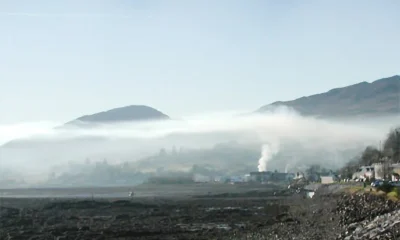
 Opinion5 days ago
Opinion5 days agoRatmalana: An international airport without modern navigational and landing aids
-

 Opinion2 days ago
Opinion2 days agoDrs. Navaratnam’s consultation fee three rupees NOT Rs. 300



